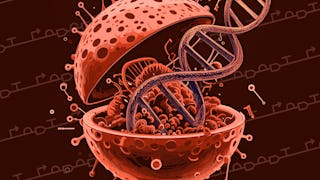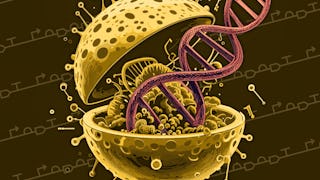This course gives an introduction to how to create genetic circuit models. These models leverage chemical reactions represented using the Systems Biology Markup Language (SBML). The second module introduces methods to simulate these models using ordinary differential equation (ODE) methods. The third module teach stochastic simulation methods. The fourth module introduces several variations of the stochastic simulation algorithm. Finally, the fifth module introduces genetic technology method that leverage computational analysis for selecting parts and verifying their performance.

Enjoy unlimited growth with a year of Coursera Plus for $199 (regularly $399). Save now.

Engineering Genetic Circuits: Modeling and Analysis
This course is part of Engineering Genetic Circuits Specialization


Instructors: Chris Myers
Included with
Recommended experience
What you'll learn
Design and analyze models of genetic circuits.
Simulate genetic circuit models using ODE simulation methods.
Simulate genetic circuit models using stochastic simulation methods.
Utilize genetic technology mappers to select parts for genetic designs.
Skills you'll gain
Details to know

Add to your LinkedIn profile
16 assignments
See how employees at top companies are mastering in-demand skills

Build your subject-matter expertise
- Learn new concepts from industry experts
- Gain a foundational understanding of a subject or tool
- Develop job-relevant skills with hands-on projects
- Earn a shareable career certificate

There are 5 modules in this course
This week will describe the basics of modeling biological systems using chemical reactions, how these models can be represented using the Systems Biology Markup Language (SBML) standard, and how these models can be constructed using software tools such as iBioSim.
What's included
23 videos7 readings2 assignments1 peer review
This module will introduce the theory and methods for the analysis of genetic circuit models using ordinary differential equations (ODEs). In particular, it will describe the classical chemical kinetic model, numerical methods for ODE simulation of these models, and techniques to analyze these ODE models qualitatively.
What's included
13 videos3 readings3 assignments1 peer review
This module will introduce stochastic analysis methods for genetic circuits. In particular, it will introduce the stochastic chemical kinetics model, Gillespie's Stochastic Simulation Algorithm (SSA) to analyze these models, and various alternative stochastic analysis methods. Finally, the module will conclude with some additional topics: the Chemical Langevin Equation, stochastic Petri nets, the phage lambda model, and spatial Gillespie methods.
What's included
20 videos4 readings4 assignments1 peer review
This module presents several variations on the SSA algorithm to solve particular analysis problems. In particular, the hierarchical SSA (hSSA) methods enable the analysis of large models, the weighted SSA (wSSA) methods allow for the analysis of rare events, and the incremental SSA (iSSA) methods enable the determination of typical behaviors.
What's included
18 videos4 readings3 assignments
This module presents various ways that modeling can be utilized in genetic circuit design to select parts for optimal performance.
What's included
21 videos4 readings4 assignments
Earn a career certificate
Add this credential to your LinkedIn profile, resume, or CV. Share it on social media and in your performance review.
Build toward a degree
This course is part of the following degree program(s) offered by University of Colorado Boulder. If you are admitted and enroll, your completed coursework may count toward your degree learning and your progress can transfer with you.¹
Instructors


Offered by
Explore more from Electrical Engineering
 Status: Free Trial
Status: Free TrialUniversity of Colorado Boulder
 Status: Free Trial
Status: Free TrialUniversity of Colorado Boulder
 Status: Free Trial
Status: Free TrialUniversity of Colorado Boulder
 Status: Free Trial
Status: Free TrialUniversity of Colorado Boulder
Why people choose Coursera for their career





Open new doors with Coursera Plus
Unlimited access to 10,000+ world-class courses, hands-on projects, and job-ready certificate programs - all included in your subscription
Advance your career with an online degree
Earn a degree from world-class universities - 100% online
Join over 3,400 global companies that choose Coursera for Business
Upskill your employees to excel in the digital economy
Frequently asked questions
To access the course materials, assignments and to earn a Certificate, you will need to purchase the Certificate experience when you enroll in a course. You can try a Free Trial instead, or apply for Financial Aid. The course may offer 'Full Course, No Certificate' instead. This option lets you see all course materials, submit required assessments, and get a final grade. This also means that you will not be able to purchase a Certificate experience.
When you enroll in the course, you get access to all of the courses in the Specialization, and you earn a certificate when you complete the work. Your electronic Certificate will be added to your Accomplishments page - from there, you can print your Certificate or add it to your LinkedIn profile.
Yes. In select learning programs, you can apply for financial aid or a scholarship if you can’t afford the enrollment fee. If fin aid or scholarship is available for your learning program selection, you’ll find a link to apply on the description page.
More questions
Financial aid available,

